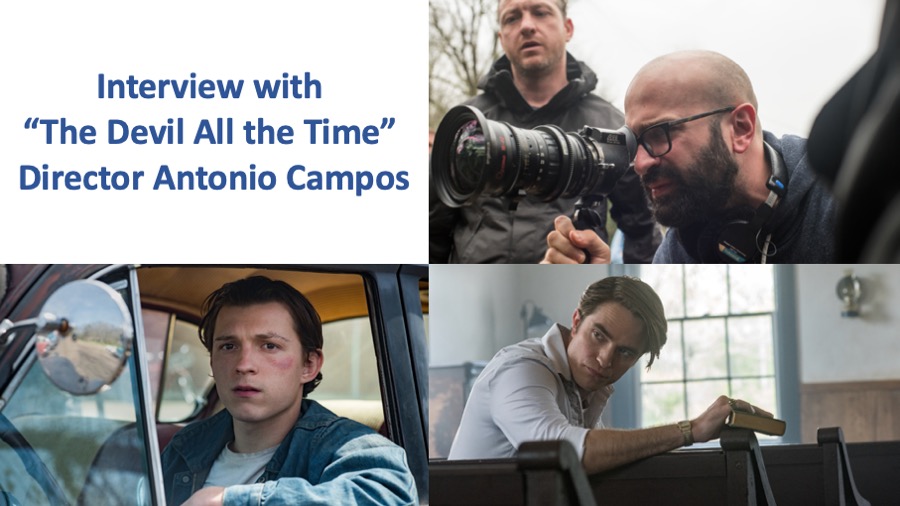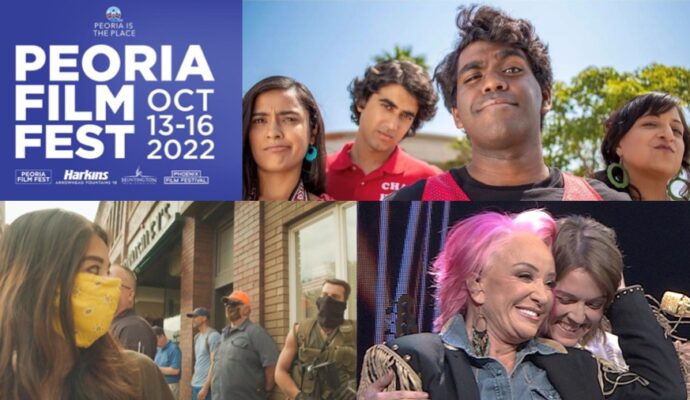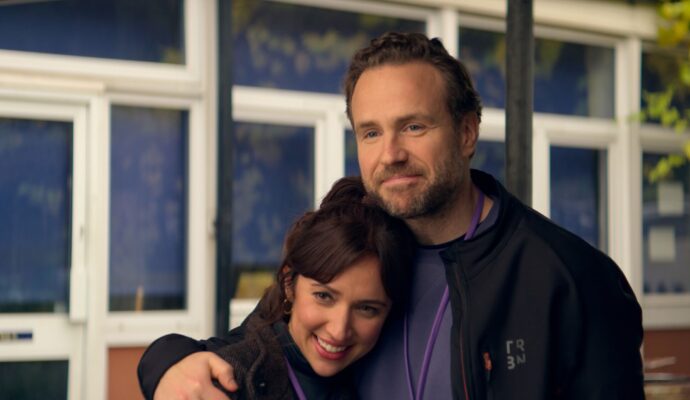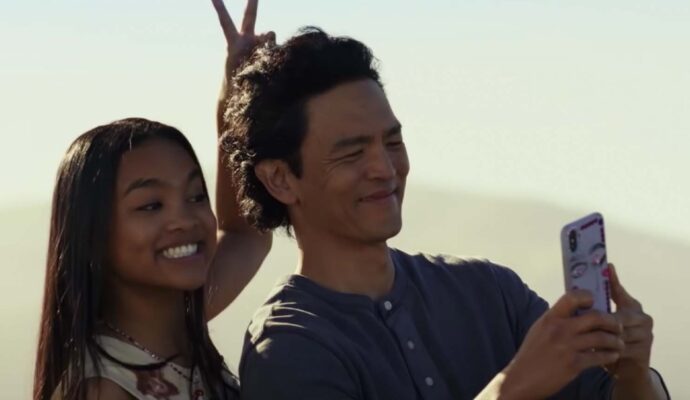Director Antonio Campos (“Christine” (2016)) recruits an all-star cast – including Tom Holland, Robert Pattinson, Sebastian Stan, Mia Wasikowska, Riley Keough, Bill Skarsgard, and Jason Clarke – for his intricate noir picture “The Devil All the Time”. This story – set in Ohio and West Virginia during the 1940s, 50s, and 60s – is adapted from Donald Ray Pollock’s debut 2011 novel with the same name. Well, Jeff Mitchell (Phoenix Film Festival, Art House Film Wire) joined other respected names for a terrific group interview with Antonio, and we discussed the film’s religious elements, Pattinson’s performance, Pollock’s narration, and much more!
“The Devil All the Time” arrives on Netflix on Sept. 16.
Q: When watching “The Devil All the Time”, I initially thought that it was an anti-religious movie, but then I read a quote from Bill Skarsgard, who plays Willard Russell, a critical patriarch in the film. He said, “The book isn’t a comment on religion, as much as it’s a comment on what people do with religions.” I appreciated his opinion, and he changed my perspective. What are your thoughts?
AC: I think that’s beautifully articulated by Bill, who is such a wise, wonderful soul. The movie is about extreme believers in religion and their faith and the dangers of that. All these characters are screaming to the heavens looking for answers, and they get (silence) in return. In that void, they fill it with an answer themselves, and if the person is traumatized or delusional, they can fill it with a dangerous answer. The film explores the dangers of extreme religion and how (those) in power can take advantage of people’s faith. That’s what we are exploring, and the film isn’t anti-religion. It is more (of) a comment on the dangers of religion in the wrong hands.
Q: You have a history of exploring dark themes in your work. What drives those choices?
AC: I think it’s the challenge of making dark characters – these complicated characters – and trying to understand what drives them and motivates some of their bad choices. Exploring the darkness in books, art, and movies…that’s a safe place to explore those themes.
Q: Robert Pattinson took his performance up a notch. Can you talk about his choices
AC: We always wanted Teagardin (Pattinson) to have this otherworldly quality. He’s designed to come into the movie and shake it up. Because Teagardin is so far outside the realm of the movie – so far outside West Virginia and Ohio – (Pattinson) had so much freedom to just run with that character and go. I (told Robert), “Just go as far as you want. Swing for the fences, and if we have to rein (you) in, we will.” I love performances like that. That was the mandate across the board. Everyone pushed themselves. Sebastian Stan, as Bodecker, is just amazing. He’s doing stuff that is really swinging for the fences, and he transforms his body (too). So, I tried to (give) everybody a sense of freedom and to have fun with their characters.
Q: You worked with your brother Paulo on this script, and did this change your writing process?
AC: Writing with (Paulo) was a great experience. He is my older brother, so there’s already a dynamic there before we got started. In a lot of ways, my brother was the guy who introduced me to so many books, movies, and music when I was a kid. So much of the reason why I love these genres is because my brother turned them on to me. We both had this inherent connection over (and a love for) the material, worked really closely and way, way into the night, sometimes until 5 or 6 in the morning. (When you work with someone that closely, you’ll) have some of the biggest fights, and you’ll also get closer in a way that you’ll never get without that experience. (There are) pros and cons, but ultimately (it brought us) even closer.
Q: My favorite part of the film was having Pollock play the narrator. How did you incorporate him into the film?
AC: From the moment that (we) started implementing narration, there was no other person in my mind than Don Ray Pollock. I knew his voice was perfect, and it’s a voice born and raised in Knockemstiff, Ohio. What actor can replicate the feel of that specific place?
That sound of Southern Ohio is very specific, and the sound of Knockemstiff is very specific. Don has that. He knew the world. He knew the characters. He created the world and the characters, so there was nobody else. I hadn’t heard (of) an author (narrating) his adaptation, so it just felt fresh and exciting. I loved the challenge of working with someone who is not an actor, because you get the kind of performance that doesn’t feel like a performance, but just someone talking to you. When Don agreed to do it, he recorded all the scripted narration. We used it as we assembled the movie (and) as we shot it. As my wife and I (edited) the (film), we would get an idea for a piece of voiceover here or there, and I would email Don right away. (He) would shoot it back pretty much immediately and give different reads on it. It was a really great collaborative process. His voice was so important to the book, and I was happy that we figured out a way of (literally) incorporating it in the movie.
Image and trailer credits: Netflix




